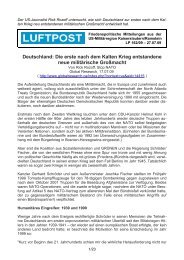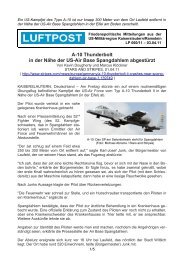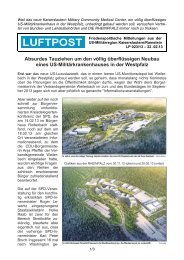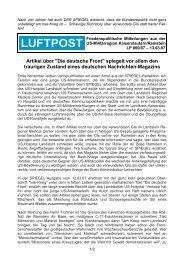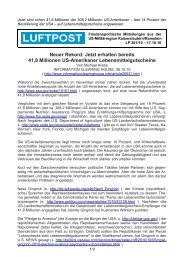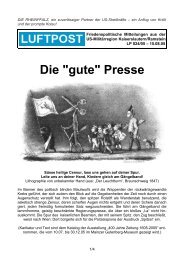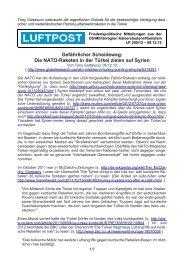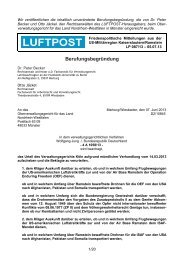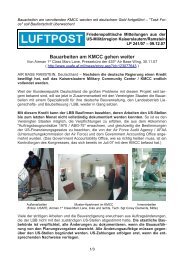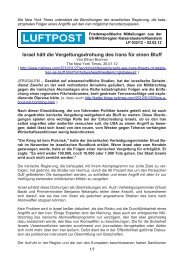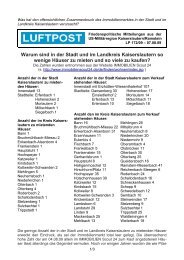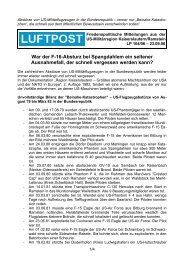Den USA stockt der Atem - Luftpost Kaiserslautern
Den USA stockt der Atem - Luftpost Kaiserslautern
Den USA stockt der Atem - Luftpost Kaiserslautern
Sie wollen auch ein ePaper? Erhöhen Sie die Reichweite Ihrer Titel.
YUMPU macht aus Druck-PDFs automatisch weboptimierte ePaper, die Google liebt.
lafi religious establishment in giving religious legitimacy to the Saudi regime, which in turn<br />
provides it with the vital funding to propagate and export its violent ideology. According to<br />
the Wahhabi ideology it is strictly forbidden to oppose the ruler. The fatwas issued by the<br />
religious establishment were utilised by the Interior ministry headed by Nayef, which declared,<br />
on February 2011, that these protests were the new terrorism and would be crushed,<br />
just like Al-Qaida. The death of Sultan, and the appointment of Nayef, in October 2011,<br />
was marked by the cold blooded mur<strong>der</strong> of protestors in the Eastern province.<br />
The Saudi regime’s overriding priority has always been to establish and bolster its position<br />
as the indisputable guardian of Sunni Islam. Ever since the Iranian revolution, the Saudi<br />
regime has endeavoured to present all the major conflicts in the region as an integral part<br />
of an ongoing existential sectarian war waged against Sunnis by Iran. So, when the uprising<br />
erupted in Bahrain, the Saudi regime strived to instigate sectarian strife, to stave of<br />
any uprising by its Sunni majority.<br />
The <strong>USA</strong> must be holding its breath as Saudi Arabia’s uprising surmounts sectarian divisions<br />
by spreading to Sunni areas like Hijaz, and even reaching the regime’s heartland, in<br />
Riyadh.<br />
The weakening in the Saudi regime’s internal front is largely due to: first, it has tirelessly<br />
supported dictators in crushing uprisings by the Sunnis in Egypt, Tunisia and Yemen. Second,<br />
its inconsistent position in unequivocally backing secular monarchies like Morocco,<br />
Jordan against Sunni Islamic movements. Third, the king’s inexcusable failure to activate<br />
the allegiance council to select the heir to the throne twice within eight months. This, has<br />
consolidated the widespread perception that the royal family is embroiled in a vicious<br />
power struggle, and it marginalises its senior members. Fourth, the undeniable success of<br />
uprisings in Egypt, Tunisia, Libya and Yemen in ousting their dictators. Fifth, the King’s<br />
failure to lead by example, rather than stipulating reform and a halt to killings in Syria.<br />
Sixth, the failure to tackle the chronic problems, such as unemployment and corruption.<br />
Seventh, foreign educated Saudis are increasingly questioning the legitimacy of dictatorship.<br />
Eighth, mounting fears of secession by the Eastern province. And finally, the death of<br />
Nayef has revealed that he was used by the regime as the perfect pretext for not un<strong>der</strong>taking<br />
meaningful reform. Because, despite the appointment of Salman – who is perceived<br />
as a reformer - there has been absolutely no reforms. And alarmingly, an upsurge in the<br />
regime’s savagery, especially with the arrest and even torture of the Shia religious lea<strong>der</strong><br />
Nimr Al Nimr.<br />
The <strong>USA</strong> should be deeply concerned about the stability of Saudi Arabia, not only because<br />
its implacable support to the regime has made a mockery of its pretention of defending democracy<br />
and human rights, but, more menacingly, Saudi Arabia was the country where<br />
(15 out of 19) of the 9/11 suicide bombers, and the mastermind, Osama Bin Laden, came<br />
from. The <strong>USA</strong> needs to stand on the right side of the present and future of Saudi Arabia,<br />
by extending the oil-for-protection deal to an (oil and concrete democratic reforms-for-protection<br />
deal).<br />
Zayd Alisa is a political analyst and a writer on Middle East affairs. Zayd was born in New<br />
York, <strong>USA</strong> and is also a British citizen resident in London. His parents are originally from<br />
Iraq.<br />
www.luftpost-kl.de<br />
VISDP: Wolfgang Jung, Assenmacherstr. 28, 67659 <strong>Kaiserslautern</strong><br />
4/4



